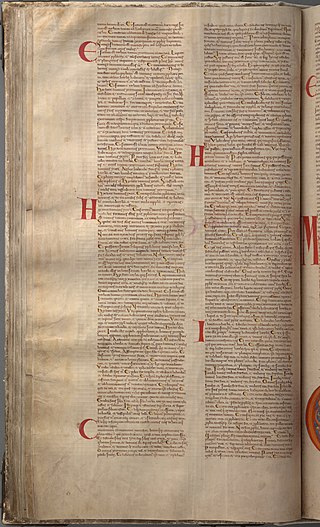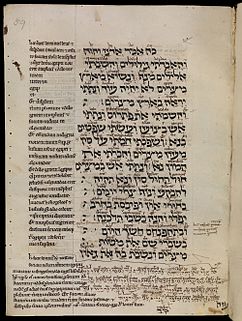
Ezekiel 48 is the forty-eighth chapter of the Book of Ezekiel in the Hebrew Bible or the Old Testament of the Christian Bible. This book contains the prophecies attributed to the prophet/priest Ezekiel, and is one of the Books of the Prophets. Chapters 40-48 give the ideal picture of a new temple. The Jerusalem Bible refers to this section as "the Torah of Ezekiel".

Zechariah 10 is the tenth of the 14 chapters in the Book of Zechariah in the Hebrew Bible or the Old Testament of the Christian Bible. This book contains the prophecies attributed to the prophet Zechariah, and is a part of the Book of the Twelve Minor Prophets. This chapter is a part of a section consisting of Zechariah 9–14.

Ezekiel 1 is the first chapter of the Book of Ezekiel in the Hebrew Bible or the Old Testament of the Christian Bible. This book contains prophecies attributed to the prophet/priest Ezekiel, and is one of the Books of the Prophets. In the New King James Version, this chapter is sub-titled "Ezekiel’s Vision of God", and in the New International Version, "Ezekiel’s Inaugural Vision". In the text, the first verse refers to "visions" (plural).

Ezekiel 4 is the fourth chapter of the Book of Ezekiel in the Hebrew Bible or the Old Testament of the Christian Bible. This book is one of the Books of the Prophets and contains the prophecies attributed to the prophet/priest Ezekiel. In this chapter, following God's command, Ezekiel performs a sign-act, a symbolic representation of the siege of Jerusalem and resulting famine.

Ezekiel 6 is the sixth chapter of the Book of Ezekiel in the Hebrew Bible or the Old Testament of the Christian Bible. This book contains the prophecies attributed to the prophet/priest Ezekiel, and is one of the Books of the Prophets. The high places in the mountains of Israel, "the seats of her idolatry", are the focus of Ezekiel's prophecies in this chapter.

Ezekiel 9 is the ninth chapter of the Book of Ezekiel in the Hebrew Bible or the Old Testament of the Christian Bible. This book contains the prophecies attributed to the prophet/priest Ezekiel, and is one of the Books of the Prophets. This chapter, sub-titled "The Wicked Are Slain" in the New King James Version, contains God's "judgment on the idolaters" who defiled the temple in Jerusalem. Ezekiel's vision of the defiled temple continues as far as Ezekiel 11:25.

Ezekiel 11 is the eleventh chapter of the Book of Ezekiel in the Hebrew Bible or the Old Testament of the Christian Bible. This book contains the prophecies attributed to the prophet/priest Ezekiel, and is one of the Books of the Prophets. In this chapter, Ezekiel pronounces judgment on Jerusalem's "wicked counsellors" and promises that God will restore Israel.

Ezekiel 13 is the thirteenth chapter of the Book of Ezekiel in the Hebrew Bible or the Old Testament of the Christian Bible. This book contains the prophecies attributed to the prophet/priest Ezekiel, and is one of the Books of the Prophets. This chapter contains rebukes against "a variety of false prophets", Ezekiel 13:1-16, and false prophetesses, Ezekiel 13:17-23.

Ezekiel 16 is the sixteenth chapter of the Book of Ezekiel in the Hebrew Bible or the Old Testament of the Christian Bible. This book contains prophecies attributed to the prophet/priest Ezekiel, and is one of the Books of the Prophets. Biblical scholar R. E. Clements calls this chapter "an Old Testament parable of the prodigal daughter", describing a shocking illustration of ungrateful Jerusalem in contrast to God's enduring love to her. This chapter is often linked to Ezekiel 23, which deals with two daughters, symbolizing the Kingdoms of Israel and Judah.

Ezekiel 20 is the twentieth chapter of the Book of Ezekiel in the Hebrew Bible or the Old Testament of the Christian Bible. This book contains the prophecies attributed to the prophet/priest Ezekiel, and is one of the Books of the Prophets. In chapters 20 to 24 there are "further predictions regarding the fall of Jerusalem". In this chapter, Ezekiel speaks on God's behalf to some of the elders of Israel.

Ezekiel 21 is the twenty-first chapter of the Book of Ezekiel in the Hebrew Bible or the Old Testament of the Christian Bible. This book contains the prophecies attributed to the prophet/priest Ezekiel, and is one of the Books of the Prophets. In chapters 20 to 24 there are "further predictions regarding the fall of Jerusalem", and this chapter also includes a prophecy against the Ammonites.

Ezekiel 25 is the twenty-fifth chapter of the Book of Ezekiel in the Hebrew Bible or the Old Testament of the Christian Bible. This book contains the prophecies attributed to the prophet/priest Ezekiel, and is one of the Books of the Prophets. This chapter contains the oracles against four nations: Ammon, Moab, Edom, and Philistia. The prophecies of God's vengeance against these and other foreign nations are recorded in other books of the prophets such as Isaiah, Jeremiah and Amos.

Ezekiel 28 is the twenty-eighth chapter of the Book of Ezekiel in the Hebrew Bible or the Old Testament of the Christian Bible. This book contains the prophecies attributed to the prophet/priest Ezekiel, and is one of the Books of the Prophets. This chapter contains a prophecy against the king of Tyre and a prophecy against neighbouring Sidon, concluding with a promise that Israel will be "delivered from the nations".

Ezekiel 29 is the twenty-ninth chapter of the Book of Ezekiel in the Hebrew Bible or the Old Testament of the Christian Bible. This book contains the prophecies attributed to the prophet/priest Ezekiel, and is one of the Books of the Prophets. Chapters 29–32 contain seven oracles against Egypt, balancing the seven oracles against Israel's smaller neighbors in chapters 25–28.

Ezekiel 30 is the thirtieth chapter of the Book of Ezekiel in the Hebrew Bible or the Old Testament of the Christian Bible. This book contains the prophecies attributed to the prophet/priest Ezekiel, and is one of the Books of the Prophets. Biblical commentator Susan Galambush observes that Chapters 29–32 contain seven oracles against Egypt, balancing the seven oracles against Israel's smaller neighbors in chapters 25–28. Andrew Davidson divides this chapter into two prophecies, "the first of which, verses 1-19, in all probability belongs to the same date as Ezekiel 29:1–16, that is, about seven months before the fall of Jerusalem; and the second, verses 20-26, is dated four months before the capture of the city".

Ezekiel 36 is the thirty-sixth chapter of the Book of Ezekiel in the Hebrew Bible or the Old Testament of the Christian Bible. This book contains the prophecies attributed to the prophet/priest Ezekiel, and is one of the Books of the Prophets. This chapter contains two prophecies, one conveying "hope for the mountains of Israel" and one declaring that Israel's restoration is assured. Biblical commentator Susan Galambush pairs the first of these with an oracle condemning Mount Seir in Edom in the previous chapter.

Ezekiel 44 is the forty-fourth chapter of the Book of Ezekiel in the Hebrew Bible or the Old Testament of the Christian Bible. This book contains the prophecies attributed to the prophet/priest Ezekiel, and is one of the Books of the Prophets. The final section of Ezekiel, chapters 40-48, give the ideal picture of a new temple. The Jerusalem Bible refers to this section as "the Torah of Ezekiel". In particular, chapters 44–46 record various laws governing the rites and personnel of the sanctuary, as a supplement to Ezekiel's vision.

Ezekiel 45 is the forty-fifth chapter of the Book of Ezekiel in the Hebrew Bible or the Old Testament of the Christian Bible. This book contains the prophecies attributed to the prophet/priest Ezekiel, and is one of the Books of the Prophets. The final section of Ezekiel, chapters 40-48, give the ideal picture of a new temple. The Jerusalem Bible refers to this section as "the Torah of Ezekiel". In particular, chapters 44–46 record various laws governing the rites and personnel of the sanctuary, as a supplement to Ezekiel's vision.

Ezekiel 46 is the forty-sixth chapter of the Book of Ezekiel in the Hebrew Bible or the Old Testament of the Christian Bible. This book contains the prophecies attributed to the prophet/priest Ezekiel, and is one of the Books of the Prophets. The final section of Ezekiel, chapters 40-48, give the ideal picture of a new temple. The Jerusalem Bible refers to this section as "the Torah of Ezekiel". In particular, chapters 44–46 record various laws governing the rites and personnel of the sanctuary, as a supplement to Ezekiel's vision.

Ezekiel 47 is the forty-seventh chapter of the Book of Ezekiel in the Hebrew Bible or the Old Testament of the Christian Bible.





